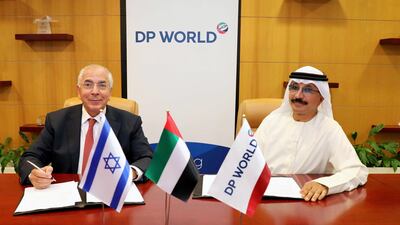DP World, one of the world’s biggest port operators, and Dubai Customs will explore opportunities to develop trade links between the UAE and Israel as the countries normalise relations.
The two sides have already signed a series of agreements to discuss the possibilities of developing trade infrastructure, the company said on Wednesday.
DP World group chairman and chief executive Sultan Ahmed bin Sulayem signed the preliminary agreements with DoverTower, a company owned by Shlomi Fogel, the co-owner of Israel Shipyards and Port of Eilat.
The agreements create a framework for the companies to work together in assessing opportunities to develop infrastructure for trade between Israel and the UAE, as well as within Israel and the region.
DP World will assess the development of Israeli ports and free zones and the potential establishment of a direct shipping route between Eilat and Jebel Ali port, the biggest in the Middle East.
Dubai Customs will facilitate trade between private entities in the two countries. Drydocks World will explore business opportunities with Israel shipyards, the company said.
“The MoUs will contribute to the efforts to tap economic and trade cooperation opportunities, and facilitate development-oriented linkages between the two countries,” Mr bin Sulayem said.
“DP World’s mission is to enable global trade – our work to build trade routes between the UAE, Israel and beyond will help our customers to do business in the region more easily and efficiently.”
Separately Dubai’s Emirates NBD signed a memorandum of understanding with Israel’s two largest lenders.
Dubai's biggest bank by assets said it concluded a preliminary agreement with Bank Hapoalim, in a short statement on Wednesday to the Dubai Financial Market, where its shares trade. In a separate statement, it also announced an agreement with the country's second-biggest lender, Bank Leumi, which has a 30 per cent market share.
"Our agreement demonstrates a further strengthening of our relationship with Israel’s banking industry, which will benefit our brand, our clients and the UAE economy, through new business and trade opportunities,” Emirates NBD's vice chairman and managing director Hesham Al Qassim said in the statement.
Abu Dhabi Islamic Bank (ADIB), also signed an MoU on Wednesday with Bank Leumi to explore areas for future cooperation in the UAE, Israel and other international markets. The preliminary agreement will open new business and trade opportunities for customers, and it supports their banking needs.
The partnership "will support our retail and corporate banking customers in their banking needs when traveling or opening businesses in Israel," said Khamis Buharoon, ADIB’s vice chairman.
The announcements come after the UAE and Israel signed the Abraham Accord on Tuesday at the White House to normalise relations. The deal with Israel allows for bilateral investments and the growth of the tourism, aviation, security, telecoms, technology, financial services, energy and healthcare sectors in both countries.
First Abu Dhabi Bank, the UAE’s biggest bank by assets, is also in discussions with Israeli lenders. These talks are intended to establish relationships that focus on correspondent banking, bilateral trade, technology and innovation, according to FAB.
"Following the signing of a memorandum of understanding between the UAE Central Bank and the Israeli Prime Minister's office, First Abu Dhabi Bank will open discussions with leading financial institutions in Israel, namely Bank Hapoalim and Bank Leumi," it said in a September 1 tweet.
Establishing financial ties between the two countries underpins bilateral trade and investment relations, the prospects of which are “exciting” for both states, UAE Minister of Economy Abdulla bin Touq said earlier this week.
The UAE is looking at eight trade and economic agreements, including double taxation and a free-trade agreement, with Israel at a later stage. Firms from both countries are signing deals together and a host of joint venture agreements are expected in almost all sectors, the minister said.


